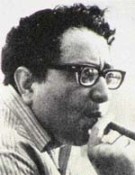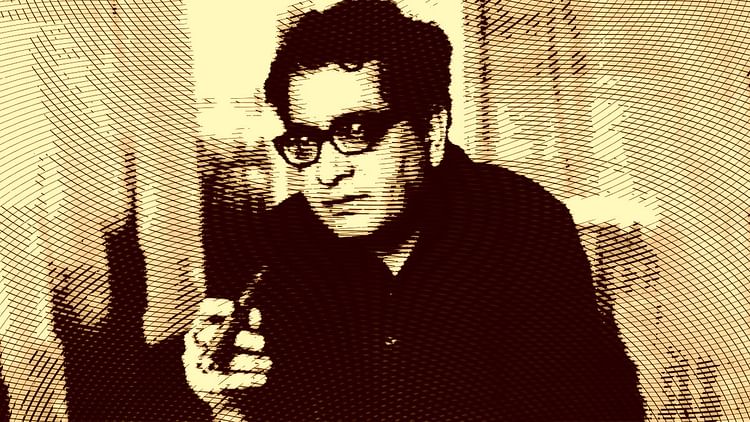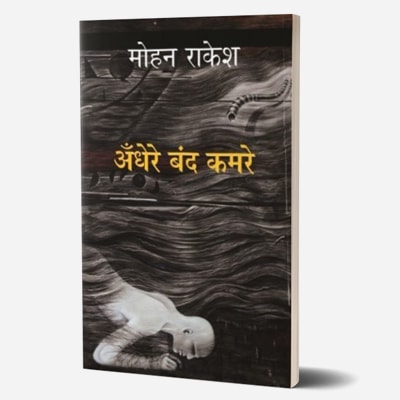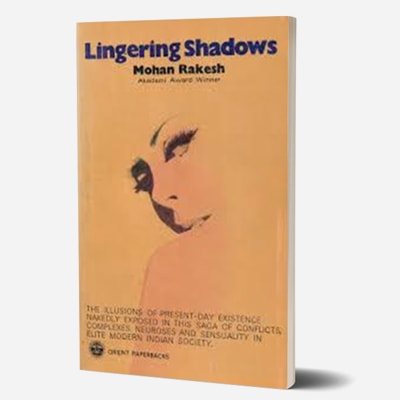
Mohan Rakesh Guglani was born in Amritsar on January 8, 1925; His father was a lawyer who had migrated from Sindh long ago. He made significant contributions to the novel, the short story, travelogue, criticism, memoir and drama.
Mohan Rakesh, born as Madan Mohan Guglani on January 8, 1925 in Amritsar, Punjab, was one of the pioneers of progressive Hindi literary movement in the 1905s.He wrote the first modern Hindi play ‘Ashadh Ka Ek Din’ (One Day in Aashad) (1958), which won a competition organized by the Sangeet Natak Akademi. He made significant contributions to the novel, the short story, travelogue, criticism, memoir and drama. He was awarded the Sangeet Natak Akademi Award in 1968.
Mohan’s father, a lawyer, died when he was sixteen. He hailed from a Sindhi family. His father migrated from Sindh to Punjab long ago. He did his M.A. in English and Hindi from Punjab University, Lahore.
Mohan started his career as a postman at Dehradun from 1947 to 1949. After that he shifted to Delhi, but found a teaching job in Jalandhar, Punjab for a short while. Subsequently, he remained Head of the Hindi department at DAV College, Jalandhar (Guru Nanak Dev University) and taught Hindi at Bishop Cotton School in Shimla for two years before coming back to teaching in Jalandhar. In Shimla, he had Ruskin Owen Bond among his students. Eventually, he resigned from his job in 1957 to write full-time. He also briefly edited Hindi literary journal Sarika, during 1962-63.
His noted novels are ‘Andhere Band Kamare’ (Closed Dark Rooms) and ‘Na Aane Wala Kal’ (The Tomorrow That Never Comes). His plays ‘Ashadh Ka Ek Din’ (One Day in Aashad) (1958), which played a major role in reviving Hindi theatre in the 1960s and ‘Adhe Adhure’ (The Incomplete Ones or Halfway House) (1969) are highly regarded. His debut play Ashadh Ka Ek Din was first performed by Kolkata-based Hindi theatre group Anamika, under director Shyamanand Jalan (1960) and subsequently by Ebrahim Alkazi at National School of Drama Delhi in 1962, which established Mohan Rakesh as the first modern Hindi playwright.
His plays continue to be performed and receive acclaim worldwide. ‘One Day in the Season of Rain’, Aparna Dharwadker’ and ‘Vinay Dharwadker’s authorized English translation of Ashadh Ka Ek Din, premiered at Carthage College in Kenosha, Wisconsin, United States in 2010 and traveled to the Kennedy Center American College Theatre Festival in 2011. In July 2019 also, The Monsoon Reading of ‘Ashaad Ka Ek Din’ was staged in India.
Lahron Ke Rajhans (The Swans of the Waves), a noted play of Mohan Rakesh about an ancient Buddhist tale on the renunciation of the Buddha, and its aftereffects on his close family, was first written as a short story and later turned into a radio play for All India Radio Jalandhar, and broadcast under the title Sundri. Prominent Indian directors Om Shivpuri, Shyamanand Jalan, Arvind Gaur and Ram Gopal Bajaj directed this play. In 2005, this very writing process of the play, and Mohan Rakesh’s diary, writings, and letters about the play, were recreated in a play titled ‘Manuscript’, by a Delhi theatre group.
In July 1971, he received the Jawahar Lal Nehru Fellowship for research on ‘The Dramatic Word’. However, he could not complete it and passed away at the young age of 46 on 3 January 1972.
 Mohan Rakesh was first married in 1950. It was an arranged marriage which ended in divorce in 1957. His second marriage in 1960 too ended soon. However, in his third marriage to Anita Aulakh in 1963, he had found love. At the time of the marriage Anita was 21 years old. After his death, she continued to live in Delhi and, now in her seventies, lives in East of Kailash neighborhood. Her autobiographical work, ‘Satrein Aur Satrein’, was first serialized in the Hindi magazine Sarika, and later published in 2002.
Mohan Rakesh was first married in 1950. It was an arranged marriage which ended in divorce in 1957. His second marriage in 1960 too ended soon. However, in his third marriage to Anita Aulakh in 1963, he had found love. At the time of the marriage Anita was 21 years old. After his death, she continued to live in Delhi and, now in her seventies, lives in East of Kailash neighborhood. Her autobiographical work, ‘Satrein Aur Satrein’, was first serialized in the Hindi magazine Sarika, and later published in 2002.
Literary work
Novels (Upanyas); Andhere Band Kamre (1961); Na Aane wala Kal (1968); Antaraal (1972); Bakalama Khuda (1974); Plays (Natak-Ekanki); Aadhe Adhure (1969); Lahron Ke Rajhans (1963); Ashadh Ka Ek Din (One Day in Ashadha, 1958).
Posthumously published
Pairon Tale Ki Zameen (1973) (Left incomplete, later completed by Kamleshwar); Ande Ke Chilke, anya ekanki tatha beej natak (1973); Rata Bitane Taka Tatha Anya Dhvani Nataka, 1974, Radhakrishna Prakashan. (Radio plays).
Translation
Mrichchkatikam, (Sanskrit play); Shakuntalam (Sanskrit play); Story anthologies (Kahani Sangrah); 10 Pratinidhi Kahaniyan (Mohan Rakesh); Rat ki Bahon Mein; Mohan Rakesh ki meri prem Kahaniyan.
 His works were translated in other languages. ‘Andhere Band Kamre’ was translated as ‘Lingering Shadows’ in English by Jai Ratan. This novel, which opens the dark rooms of the physical, intellectual and cultural ambitions of the Indian elite class, is one of the most famous Hindi stories. A master in portraying pain as a result of a dysfunctional personal relationship, Mohan Rakesh beautifully projects the duality of elite in this novel. The elite civil mind of the present Indian society is divided into two parts: one is steeped in western modernism while the second clings to a hereditary ritualism.
His works were translated in other languages. ‘Andhere Band Kamre’ was translated as ‘Lingering Shadows’ in English by Jai Ratan. This novel, which opens the dark rooms of the physical, intellectual and cultural ambitions of the Indian elite class, is one of the most famous Hindi stories. A master in portraying pain as a result of a dysfunctional personal relationship, Mohan Rakesh beautifully projects the duality of elite in this novel. The elite civil mind of the present Indian society is divided into two parts: one is steeped in western modernism while the second clings to a hereditary ritualism.
Two of his literary works were adapted by the filmmaker Mani Kaul. The first film was Uski Roti made in 1969 based on the short story of the same name. For this film, Mohan Rakesh wrote the dialogs. The second film was Ashadh Ka Ek Din made in 1971, based on a play by Mohan Rakesh. Both these films are considered landmark films of the Indian Parallel cinema.
Mitti ke Rang, a series of short stories on Doordarshan during 1990s were based on short stories of Mohan Rakesh.
Thoughts of Mohan Rakesh
Mohan Rakesh is referred to as a pioneer of the Nayi Kahani (New Story) movement in modern Hindi literature, but he didn’t think there was anything ‘new’ in the movement.
“It is neither the newness of subject matter, nor the new or old or unfamiliar character portrayals that constitute the newly developed form of short story,” said the playwright and author in an interview to the Journal of South Asian Literature, published in 1968.
“Our emphasis was on the emergence of an idea through the reality itself, interpreting the reality around us. There was a sort of restlessness among us to capture the mood of our time. Nayi Kahani became a symbol for our effort to alienate the short story from what it was after Premchand.”
Connoisseurs of Hindi literature think of Rakesh as someone who brought forth the realities of the Indian middle-class lives through his characters. After the trauma of Partition, India was struggling to get back on its feet and keep pace with the modernizing world around it. The Indians were trying to overcome the challenges of a changing society, and Rakesh portrayed their dilemmas in his short stories and plays.
His first collection of short stories, Insan ke Khandhar, was published in 1950. His next collection, Naye Badal, appeared seven years later in 1957 followed by Janwar Aur Janwar (1959), Ek Aur Zindagi (1961) and Faulad Ka Akash (1966). But he is perhaps best known for his plays, notably Ashadh Ka Ek Din (1958; his first), Lehron Ke Rajhans (1963), Adhe Adhure (1969) and Na Aane Wala Kal (1968).
What others thought about Mohan Rakesh
“There is an unending quest for something new. The characters go through a similar dilemma stuck in a fast changing world around them,” author-filmmaker Surendra Manan tells. “In Lehron Ke Rajhans, Ashadh Ka Ek Din and similar other writings of Rakesh, we find the characters trying to challenge the status quo in order to break free from the gloom and stillness of life, but yet they fail.”
Theatre director and writer Kuldeep Kunal describes Rakesh’s plays as “forever relevant and closer to realism”. Kunal, who re-adapted Ashadh Ka Ek Din, based on Kalidas’ life, to a contemporary setting, struggled with recreating the brilliance on stage.
“My favorite adaptation of it was done by renowned Punjabi playwright the late Balraj Pandit, even better than many of its Hindi adaptations,” he tells. “One thing I really liked about his characters is that there is no judgement of right or wrong. Every character is in a grey zone, which connects with the reader.”
Language as a tool
Noted writer translator Rajinder Paul says Mohan Rakesh “struggled like a sculptor with the stony language of Hindi to sharpen its edges”. In an interview to Mohan Maharshi, Rakesh said, “I want to go close to that language which is the language of being and not merely the language to know.”
And he used language in different ways to tell different stories. “There is not a particular style of language one can find common in his plays,” Surendra Manan tells. “Ashadh Ka Ek Din has the influence of Sanskritised poetry as it is based in a different era, inspired by Kalidas’s life. In Adhe Adhure, the language is very simple reflecting the times the play was based in.”
Women in his plays
“Rakesh’s women are exceptionally strong in dealing with the pressures of convention or circumstance, and so memorably vital that he has often been accused of rendering his male characters too weak and vacillating,” writes professor and author Renu Juneja in the Journal of South Asian Literature.
Whether it is Mallika from Ashadh Ka Ek Din or Sundari from Lehron Ke Rajhans, no two characters are the same. “While Mallika is an emotional woman, Sundari is a victim of her conditions… In Adhe Adhure, Savitri represents the consciousness of a practical woman who is caught in the process of change, dealing with her ‘good for nothing’ husband,” Kunal tells.
____________________
Source: The Print, Wikipedia, Bharatpedia, Indian Novel Collective
